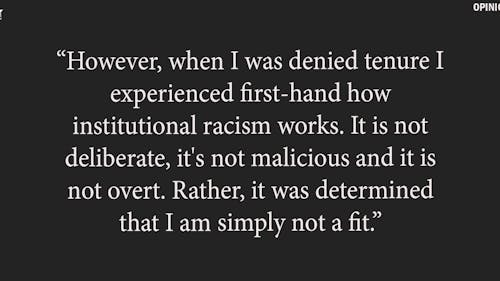COMMENTARY: #SCIsoWhite

I have enjoyed my time at Rutgers and have enjoyed working at the School of Communication and Information (SC&I). There are many colleagues who are genuine anti-racists and who have taken time to help and support me through my six years here. However, when I was denied tenure I experienced first-hand how institutional racism works. It is not deliberate, it's not malicious and it is not overt. Rather, it was determined that I am simply not a fit.
Over the past 14 years, I have passionately pursued research in the area of health communication. I received a Ph.D. from Pennsylvania State University and was immediately invited to join the Program in Health Disparities at the University of Minnesota’s Medical School as a postdoctoral associate. My work was well received and I have, to date, produced 26 publications, of which 18 are in top-ranked, peer-reviewed journals. At Minnesota, I became the first person to be awarded three grants in one year, and the university later awarded me a plaque honoring my research. Despite these accolades, I was not good enough.
It came as a shock that in a 7-5 vote, my department denied me tenure. It was argued that I do not publish enough in my field of communication, and my interdisciplinarity was frowned upon even though SC&I and Rutgers routinely emphasize scholarship and collaboration across disciplines, departments and schools.
I was glad to learn that I had support from the School-wide Promotion Committee and the dean, both of which disagreed with the department’s assessment and unanimously recommended that I be granted tenure. In countering the department’s arguments against me, the Promotion Committee notes that eight experts in my field, from both peer institutions and those more prestigious than Rutgers, who were asked to evaluate my work, all contributed “positive” evaluation letters on my behalf.
Despite the best efforts of the SC&I Promotion Committee and the dean, the University Promotion Committee denied me tenure. In their letter, which contains a mere seven lines of assessment of my accomplishments, they do not even attempt to counter the arguments made in support of my tenure. And even while they note that I am a “productive scholar in an important area,” they state that my teaching is below average based on some student evaluations. Study after study shows these evaluations are an inadequate means of judging teaching effectiveness due to unconscious biases along lines of gender and race. Yet even using that unreliable measure, they seem to have ignored my overall averages from my very first to last class prior to evaluation, which are about 3.7 on a scale of 5 for teaching effectiveness.
When I received this news, I felt like I was a failure. I did not have the emotional resources to immediately challenge this decision. Despite all of my hard work, I had come up against the limits of what is possible for a black woman on our university campuses today.
I finally decided to fight and to file a grievance that my union, the Rutgers AAUP-AFT, is handling. With the help of my union and students in the Black Lives Matter chapter on campus, I am still filled with anxiety and fear. Powerful people at my school and the University are working to ensure that I do not get justice.
Instructions were sent to faculty at my school stating that the deliberations in promotion meetings are strictly confidential. This is not accurate, according to the union. There are no prohibitions at the University about confidentiality at such meetings after the conclusion of a process. If anything, when a particular process goes wrong it is important to have transparency. The grievance I filed shows that there were violations of the established procedure for tenure evaluation. If individuals are not allowed to come forward to discuss what went wrong, and to testify before the grievance committee, the grievance process is meaningless. There would be no way to evaluate whether the promotion process was fair and whether the decision made was correct or not. A gag rule was imposed on my colleagues.
Troublingly, the two individuals who sent these instructions about confidentiality are the very same people who are representing the University against me in the grievance hearing — the SC&I associate dean for Administration and my department chair.
It is also troubling that my department chair is representing the University at the grievance hearing, something that happens rarely. My concern is that my colleagues in the Department of Communication might understandably be worried about speaking at the hearing. The chair’s presence could create an atmosphere of intimidation, which could taint the outcome and tarnish its fairness.
As I go through this struggle, I have heard more and more stories about colleagues of color at SC&I who were denied tenure. SC&I, a school with about 50 tenured and tenure-track faculty, has only one tenured faculty member of color, who happens to earn among the lowest salaries of tenured faculty at SC&I. It’s sad. But in its 34-year history, SC&I has been a largely white institution.
Jennifer R. Warren is an assistant professor in the Department of Communication.
___
YOUR VOICE | The Daily Targum welcomes submissions from all readers. Due to space limitations in our print newspaper, letters to the editor must not exceed 500 words. Guest columns and commentaries must be between 700 and 850 words. All authors must include their name, phone number, class year and college affiliation or department to be considered for publication. Please submit via email to oped@dailytargum.com by 4 p.m. to be considered for the following day’s publication. Columns, cartoons and letters do not necessarily reflect the views of the Targum Publishing Company or its staff.



